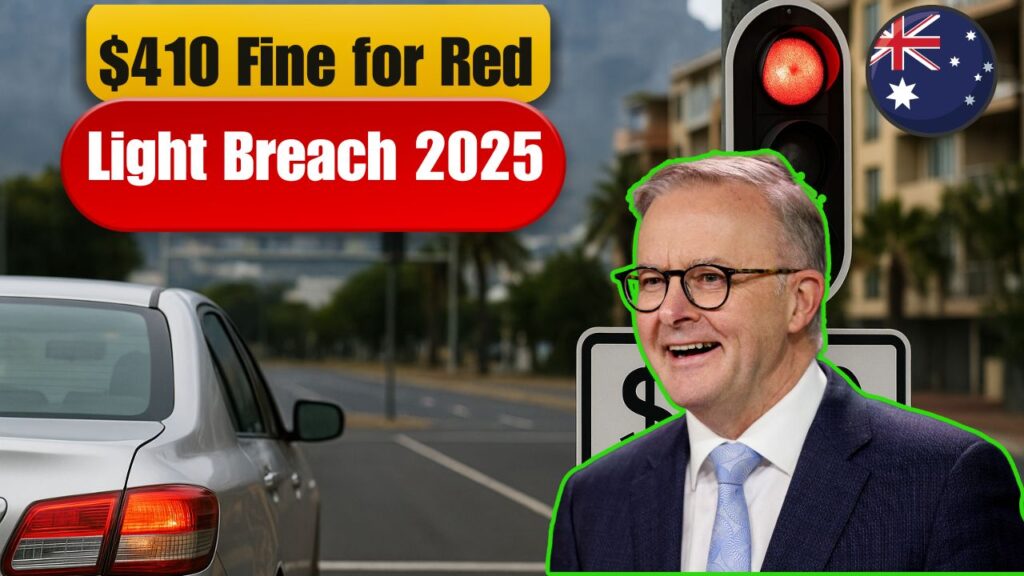In 2025, Australian road rules are tightening further with a new traffic law that introduces a hefty $410 fine for drivers breaching red lights — even if they don’t actually cross the junction. This update aims to improve intersection safety and reduce the number of near-miss incidents caused by drivers stopping too late. The rule applies nationwide and will be strictly monitored through traffic cameras. Motorists are urged to be more cautious, as even a partial violation at the stop line could result in an expensive penalty and potential demerit points.

Understanding the New Red Light Fine Policy in Australia 2025
The 2025 Australian traffic law marks a significant shift in enforcement. The new $410 red light fine applies not only when drivers run through an intersection but also if they fail to stop completely before the stop line when the light turns red. Authorities have clarified that this measure targets reckless behavior, especially at high-risk crossings.
- Applicable across all states and territories.
- Monitored through advanced red-light cameras.
- Includes additional 3 demerit points on driver’s licence.
This rule encourages disciplined driving and ensures better pedestrian and vehicle safety at intersections nationwide.
Why the Australian Government Introduced the $410 Traffic Fine
The Australian government introduced the $410 red light fine to curb an alarming increase in intersection violations. Research by Transport for NSW showed that nearly 20% of road crashes in 2024 occurred at traffic lights, often due to drivers stopping beyond the white line. The new regulation ensures that all vehicles remain behind the line once the signal turns red, preventing dangerous roll-forwards.
- Helps reduce road accidents and fatalities.
- Improves discipline at intersections.
- Supports automated enforcement through AI-based cameras.
This change aligns with Australia’s “Vision Zero” initiative to achieve zero road deaths by 2050.
 Australia Confirms Tougher Road Laws – Melbourne Drivers Face $1,000 Fine for Speeding Offences
Australia Confirms Tougher Road Laws – Melbourne Drivers Face $1,000 Fine for Speeding Offences
How Australian Drivers Can Avoid Fines Under the 2025 Law
Drivers can easily avoid the $410 red light fine by maintaining alertness and following signal instructions closely. It’s important to slow down early when approaching an amber light, as rushing through can trigger violations.
- Always stop before the white line when lights turn red.
- Check local road signs and enforcement cameras.
- Update yourself on regional variations in rules and penalties.
Being aware of traffic updates and maintaining proper braking distance can save drivers from losing demerit points or paying hefty fines.

Key Traffic Penalties and Enforcement Details in Australia 2025
With the introduction of stricter road safety norms, several other penalties have also been updated. Fines for mobile phone usage, speeding near schools, and improper seatbelt use have increased. Enforcement technology now includes high-resolution intersection cameras and automated penalty notifications through digital platforms like Service NSW and VicRoads. These tools make it easier for authorities to detect even minimal violations, emphasizing a culture of road safety and responsibility.
| Offence Type | Fine Amount (AUD) | Demerit Points | Applicable States |
|---|---|---|---|
| Red Light Breach (No Crossing) | $410 | 3 | All States |
| Running Red Light (Crossing Junction) | $550 | 4 | All States |
| Mobile Phone Use While Driving | $600 | 5 | NSW, VIC, QLD |
| Speeding in School Zone | $500 | 4 | Nationwide |
FAQs on New Australian Red Light Fine 2025
Q1: What is the fine for breaching a red light in Australia 2025?
A: The fine is $410 even if you do not cross the intersection.
Q2: Do I get demerit points for stopping over the line?
A: Yes, drivers receive 3 demerit points along with the fine.
Q3: Are red light cameras active everywhere in Australia?
A: Yes, they are operational in all major cities and intersections.
Q4: How can I appeal a red light fine in Australia?
A: You can appeal through your state’s transport authority if you believe the fine was issued unfairly.




